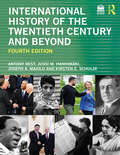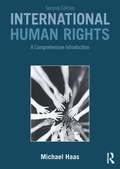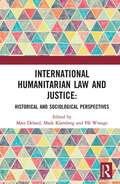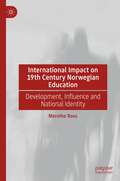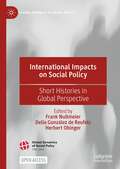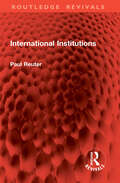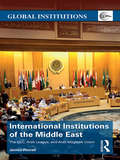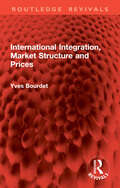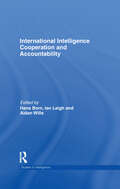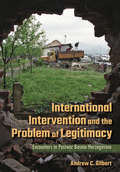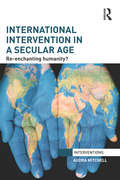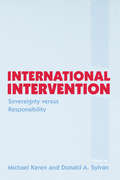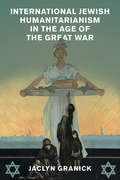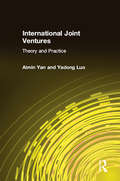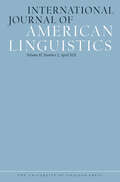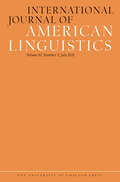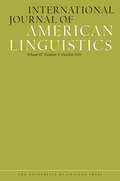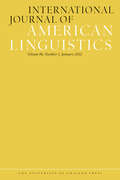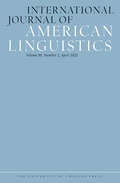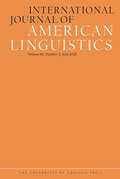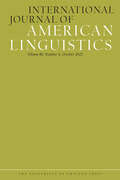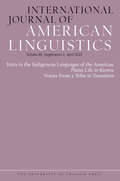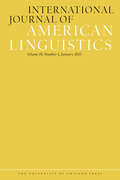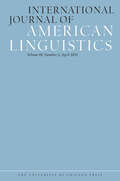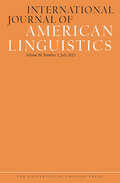- Table View
- List View
International History of the Twentieth Century and Beyond
by Jussi M. Hanhimäki Joseph A. Maiolo Kirsten E. Schulze Antony BestNow in its fourth edition, this highly successful global history of the twentieth century is written by four prominent international historians for first-year undergraduate level and upward.Using their thematic and regional expertise, the authors have produced an authoritative yet accessible and seamless account of the history of international relations in the last century, covering events in Europe, Asia, the Middle East, Africa and the Americas. They focus on the history of relations between states and on the broad ideological, economic and cultural forces that have influenced the evolution of international politics over the last 120 years. The fourth edition is thoroughly updated to take account of the most recent research and global developments, including new material on the impact of the Trump administration on international politics, the rise of China under the leadership of Xi Jinping and the origins of the wars in Ukraine and Gaza.The book is supported by a fully revised companion website including links to further resources and self-testing material, which can be found at www.routledgelearning.com/internationalhistory20c.
International Human Rights: A Comprehensive Introduction
by Michael HaasThis book provides a comprehensive introduction to international human rights -- international human rights law, why international human rights have increasingly risen to world prominence, what is being done about violations of human rights, and what might be done to further promote the cause of international human rights so that everyone may one day have their rights respected regardless of who they are or where they live. It explains: how the concept of international human rights has developed over time the variety of types of human rights (civil-political rights, economic-social rights, as well as a delineation of war crimes) empirical findings from statistical research on human rights institutional efforts to promote human rights an extensive listing of international human rights agreements identification of recent prosecutions of war criminals in domestic and international tribunals ongoing efforts to promote human rights through international aid programs the newest dimensions in the field of human rights (gay rights, animal rights, environmental rights). Richly illustrated throughout with case studies, controversies, court cases, think points, historical examples, biographical statements, and suggestions for further reading, International Human Rights is the ideal introduction for all students of human rights. The book will also be useful for human rights activists to learn how and where to file human rights complaints in order to bring violators to justice. The new edition is fully updated and includes new material on: the Obama presidency the Arab Spring and its aftermath the workings of the International Criminal Court quantitative analyses of human rights war crimes.
International Humanitarian Law and Justice: Historical and Sociological Perspectives
by Mats Deland Mark Klamberg Pål WrangeIn the last decade, there has been a turn to history in international humanitarian law and its accompanying fields. To examine this historization and to expand the current scope of scholarship, this book brings together scholars from various fields, including law, history, sociology, and international relations. Human rights law, international criminal law, and the law on the use of force are all explored across the text’s four main themes: historiographies of selected fields of international law; evolution of specific international humanitarian law rules in the context of legal gaps and fault lines; emotions as a factor in international law; and how actors can influence history. This work will enhance and broaden readers’ knowledge of the field and serve as an excellent starting point for further research.
International Impact on 19th Century Norwegian Education: Development, Influence and National Identity
by Merethe RoosThis book examines Norwegian education throughout the course of the 19th century, and discusses its development in light of broader transnational impulses. The nineteenth century is regarded as a period of increasing national consciousness in Norway, pointing forward to the political independency that the country was granted in 1905. Education played an important role in this process of nationalisation: the author posits that transnational – for the most part Scandinavian – impulses were more decisive for the development of Norwegian education than has been acknowledged in previous research. Drawing on the work of educator and school bureaucrat Hartvig Nissen, who is recognised as the most important educational strategist in 19th century Norway, this book will be of interest to scholars of the history of education and Norwegian education more generally.
International Impacts on Social Policy: Short Histories in Global Perspective (Global Dynamics of Social Policy)
by Herbert Obinger Frank Nullmeier Delia González de ReufelsThis open access book consists of 39 short essays that exemplify how interactions between inter- and trans-national interdependencies and domestic factors have shaped the dynamics of social policy in various parts of the world at different points in time. Each chapter highlights a specific type of interdependence which has been identified to provide us with a nuanced understanding of specific social policy developments at discrete points in history. The volume is divided into four parts that are concerned with a particular type of cross-border interrelation. The four parts examine the impact on social policy of trade relations and economic crises, violence, international organisations and cross-border communication and migration. This book will be of interest to academics and postgraduate students in the field of social policy, global history and welfare state research from diverse disciplines: sociology, political science, history, law and economics.
International Institutions (Routledge Revivals)
by Paul ReuterOriginally published in 1958, this book assesses the continuity and variety of international societies as they have existed in recent history. Although the study of international institutions is firmly based on a foundation of law, this book also encompasses sociology, history and politics. The introduction defines the elements of international society in terms of the accepted principles of group psychology. Part 1 considers the origins of 20th Century international institutions. This historical analysis runs from the ancient civilizations through to the greatly changed relations which followed World War II. The general notions and sources of international law are then examined. Part 2 deals with the structure of day-to-day relations between States and the means of recognizing changes within a State. The United Nations and principal regional organizations are also examined.
International Institutions of the Middle East: The GCC, Arab League, and Arab Maghreb Union (Global Institutions)
by James WorrallThis volume is a key text for understanding the major regional international organizations of the Middle East. Analysing the Arab League, the Gulf Cooperation Council, and the Arab-Maghreb Union in a concise and accessible format, it explores their successes and failures across their full range of activities (economic, social, and political), while contextualising the reasons why many consider that these organizations have stalled.The book:- assesses the reasons why IOs in the Middle East are under-developed relative to neighbouring regional organizations;- explores their history, evolution, and structure, while considering the successes and failures of each IO;- analyses the reasons for the specific difficulties faced by each organization through the context of intra-regional relations;- develops a new framework for analysing the forces that have shaped these bodies and challenges the existing narrative that largely ignores the achievements and prospects of the organizations;- considers the likely impact of the Arab Spring upon the future development of these frequently overlooked regional international organizations.This book will be of great interest to students and scholars of Middle East studies, international organizations, and global governance, as well as diplomats and policymakers
International Integration, Market Structure and Prices (Routledge Revivals)
by Yves BourdetOriginally published in 1988, this study focusses on international economic integration in relation to the passenger car industry and market in the West-European car-making countries, Germany, France, Italy, Sweden and the UK in the second half of the 20th Century when the revival of protectionism was a key feature of the international trading system. The book illustrates the interaction between international integration, market structure and firm conduct and the political sphere at the national as well as the supranational level. Unlike previous analyses of international integration, this book concentrates on a single industry over a significant period.
International Intelligence Cooperation and Accountability (Studies in Intelligence)
by Hans BornThis book examines how international intelligence cooperation has come to prominence post-9/11 and introduces the main accountability, legal and human rights challenges that it poses. Since the end of the Cold War, the threats that intelligence services are tasked with confronting have become increasingly transnational in nature – organised crime, the proliferation of weapons of mass destruction and terrorism. The growth of these threats has impelled intelligence services to cooperate with contemporaries in other states to meet these challenges. While cooperation between certain Western states in some areas of intelligence operations (such as signals intelligence) is longstanding, since 9/11 there has been an exponential increase in both their scope and scale. This edited volume explores not only the challenges to accountability presented by international intelligence cooperation but also possible solutions for strengthening accountability for activities that are likely to remain fundamental to the work of intelligence services. The book will be of much interest to students of intelligence studies, security studies, international law, global governance and IR in general.
International Intervention and the Problem of Legitimacy: Encounters in Postwar Bosnia-Herzegovina
by Andrew GilbertIn International Intervention and the Problem of Legitimacy Andrew C. Gilbert argues for an ethnographic analysis of international intervention as a series of encounters, focusing on the relations of difference and inequality, and the question of legitimacy that permeate such encounters. He discusses the transformations that happen in everyday engagements between intervention agents and their target populations, and also identifies key instabilities that emerge out of such engagements. Gilbert highlights the struggles, entanglements and inter-dependencies between and among foreign agents, and the people of Bosnia-Herzegovina that channel and shape intervention and how it unfolds.Drawing upon nearly two years of fieldwork studying in postwar Bosnia and Herzegovina, Gilbert's probing analysis identifies previously overlooked sites, processes, and effects of international intervention, and suggests new comparative opportunities for the study of transnational action that seeks to save and secure human lives and improve the human condition.Above all, International Intervention and the Problem of Legitimacy foregrounds and analyzes the open-ended, innovative, and unpredictable nature of international intervention that is usually omitted from the ordered representations of the technocratic vision and the confident assertions of many critiques.
International Intervention in a Secular Age: Re-Enchanting Humanity? (Interventions)
by Audra MitchellInternational intervention is not just about ‘saving’ human lives: it is also an attempt to secure humanity’s place in the universe. This book explores the Western secular beliefs that underpin contemporary practices of intervention—most importantly, beliefs about life, death and the dominance of humanity. These beliefs shape a wide range of practices: the idea that human beings should intervene when human lives are at stake; analyses of violence and harm; practices of intervention and peace-building; and logics of killing and letting die. Ironically, however, the Western secular desire to ensure the meaningfulness of human life at all costs contributes to processes of dehumanization, undercutting the basic goals of intervention. To explore this paradox, International Intervention in a Secular Age engages with examples from around the world, and draws on interdisciplinary sources: anthropologies of secularity and IR, posthumanist political philosophy, ontology and the sociology of death. This book offers new insight into perennial problems, such as the reluctance of intervenors to incur fatalities, and international inaction in the face of escalating violence. It also exposes new dilemmas, such as the dehumanizing effects of quantifying casualties, Western secular logics of killing, and the appropriation of lives and deaths through peace-building processes. It will be of great interest to students and scholars of international relations, political philosophy, international ethics and social anthropology.
International Intervention: Sovereignty versus Responsibility
by Michael Keren Donald A. SylvanNational sovereignty, defined as a nation's right to exercise its own law and practise over its territory, is a cherished norm in the modern era, and yet it raises great legal, political and ethical dilemmas. This study looks at the problems created by international intervention.
International Jewish Humanitarianism in the Age of the Great War (Human Rights in History)
by Jaclyn GranickIn 1914, seven million Jews across Eastern Europe and the Eastern Mediterranean were caught in the crossfire of warring empires in a disaster of stupendous, unprecedented proportions. In response, American Jews developed a new model of humanitarian relief for their suffering brethren abroad, wandering into American foreign policy as they navigated a wartime political landscape. The effort continued into peacetime, touching every interwar Jewish community in these troubled regions through long-term refugee, child welfare, public health, and poverty alleviation projects. Against the backdrop of war, revolution, and reconstruction, this is the story of American Jews who went abroad in solidarity to rescue and rebuild Jewish lives in Jewish homelands. As they constructed a new form of humanitarianism and re-drew the map of modern philanthropy, they rebuilt the Jewish Diaspora itself in the image of the modern social welfare state.
International Joint Ventures: Theory and Practice
by Yadong Luo Aimin YanThe first book-length treatment of theories, practical lessons, and the full set of critical issues that affect international joint ventures. It addresses culture, human resources, learning, legal, management, and research and development, and presents a full set of decisions and detailed guidelines for IJV formation and management. It also thoroughly analyzes 30 case studies.
International Journal of American Linguistics, volume 87 number 2 (April 2021)
by International Journal of American LinguisticsThis is volume 87 issue 2 of International Journal of American Linguistics. The International Journal of American Linguistics (IJAL) is dedicated to the documentation and analysis of the indigenous languages of the Americas. Founded by Franz Boas and Pliny Earle Goddard in 1917, the journal focuses on the linguistics of American Indigenous languages. IJAL is an important repository for research based on field work and archival materials on the languages of North and South America.
International Journal of American Linguistics, volume 87 number 3 (July 2021)
by International Journal of American LinguisticsThis is volume 87 issue 3 of International Journal of American Linguistics. The International Journal of American Linguistics (IJAL) is dedicated to the documentation and analysis of the indigenous languages of the Americas. Founded by Franz Boas and Pliny Earle Goddard in 1917, the journal focuses on the linguistics of American Indigenous languages. IJAL is an important repository for research based on field work and archival materials on the languages of North and South America.
International Journal of American Linguistics, volume 87 number 4 (October 2021)
by International Journal of American LinguisticsThis is volume 87 issue 4 of International Journal of American Linguistics. The International Journal of American Linguistics (IJAL) is dedicated to the documentation and analysis of the indigenous languages of the Americas. Founded by Franz Boas and Pliny Earle Goddard in 1917, the journal focuses on the linguistics of American Indigenous languages. IJAL is an important repository for research based on field work and archival materials on the languages of North and South America.
International Journal of American Linguistics, volume 88 number 1 (January 2022)
by International Journal of American LinguisticsThis is volume 88 issue 1 of International Journal of American Linguistics. The International Journal of American Linguistics (IJAL) is dedicated to the documentation and analysis of the indigenous languages of the Americas. Founded by Franz Boas and Pliny Earle Goddard in 1917, the journal focuses on the linguistics of American Indigenous languages. IJAL is an important repository for research based on field work and archival materials on the languages of North and South America.
International Journal of American Linguistics, volume 88 number 2 (April 2022)
by International Journal of American LinguisticsThis is volume 88 issue 2 of International Journal of American Linguistics. The International Journal of American Linguistics (IJAL) is dedicated to the documentation and analysis of the indigenous languages of the Americas. Founded by Franz Boas and Pliny Earle Goddard in 1917, the journal focuses on the linguistics of American Indigenous languages. IJAL is an important repository for research based on field work and archival materials on the languages of North and South America.
International Journal of American Linguistics, volume 88 number 3 (July 2022)
by International Journal of American LinguisticsThis is volume 88 issue 3 of International Journal of American Linguistics. The International Journal of American Linguistics (IJAL) is dedicated to the documentation and analysis of the indigenous languages of the Americas. Founded by Franz Boas and Pliny Earle Goddard in 1917, the journal focuses on the linguistics of American Indigenous languages. IJAL is an important repository for research based on field work and archival materials on the languages of North and South America.
International Journal of American Linguistics, volume 88 number 4 (October 2022)
by International Journal of American LinguisticsThis is volume 88 issue 4 of International Journal of American Linguistics. The International Journal of American Linguistics (IJAL) is dedicated to the documentation and analysis of the indigenous languages of the Americas. Founded by Franz Boas and Pliny Earle Goddard in 1917, the journal focuses on the linguistics of American Indigenous languages. IJAL is an important repository for research based on field work and archival materials on the languages of North and South America.
International Journal of American Linguistics, volume 88 number S1 (April 2022)
by International Journal of American LinguisticsThis is volume 88 issue S1 of International Journal of American Linguistics. The International Journal of American Linguistics (IJAL) is dedicated to the documentation and analysis of the indigenous languages of the Americas. Founded by Franz Boas and Pliny Earle Goddard in 1917, the journal focuses on the linguistics of American Indigenous languages. IJAL is an important repository for research based on field work and archival materials on the languages of North and South America.
International Journal of American Linguistics, volume 89 number 1 (January 2023)
by International Journal of American LinguisticsThis is volume 89 issue 1 of International Journal of American Linguistics. The International Journal of American Linguistics (IJAL) is dedicated to the documentation and analysis of the indigenous languages of the Americas. Founded by Franz Boas and Pliny Earle Goddard in 1917, the journal focuses on the linguistics of American Indigenous languages. IJAL is an important repository for research based on field work and archival materials on the languages of North and South America.
International Journal of American Linguistics, volume 89 number 2 (April 2023)
by International Journal of American LinguisticsThis is volume 89 issue 2 of International Journal of American Linguistics. The International Journal of American Linguistics (IJAL) is dedicated to the documentation and analysis of the indigenous languages of the Americas. Founded by Franz Boas and Pliny Earle Goddard in 1917, the journal focuses on the linguistics of American Indigenous languages. IJAL is an important repository for research based on field work and archival materials on the languages of North and South America.
International Journal of American Linguistics, volume 89 number 3 (July 2023)
by International Journal of American LinguisticsThis is volume 89 issue 3 of International Journal of American Linguistics. The International Journal of American Linguistics (IJAL) is dedicated to the documentation and analysis of the indigenous languages of the Americas. Founded by Franz Boas and Pliny Earle Goddard in 1917, the journal focuses on the linguistics of American Indigenous languages. IJAL is an important repository for research based on field work and archival materials on the languages of North and South America.
